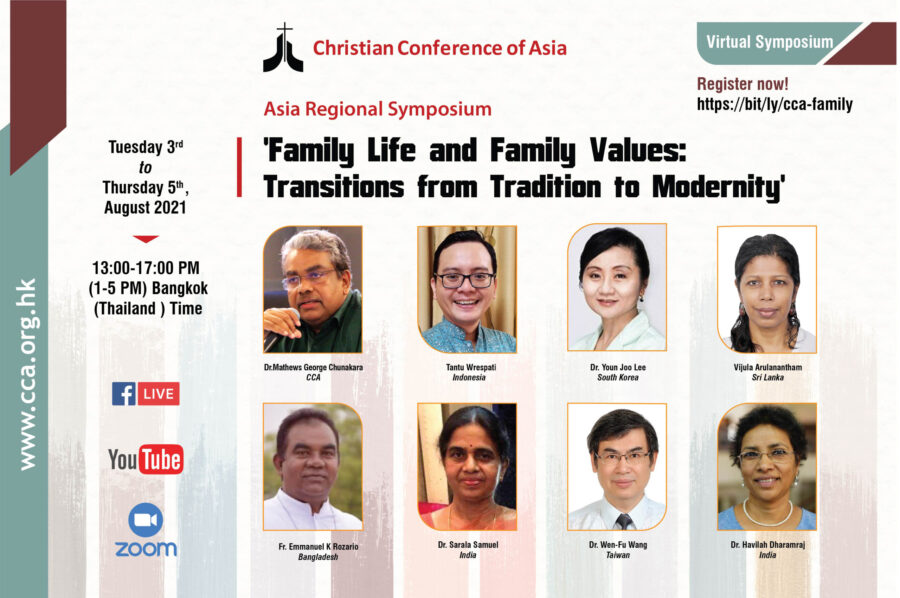CCA to organise Regional Symposium on ‘Family Life and Family Values: Transition from Tradition to Modernity’
 The Christian Conference of Asia (CCA) will organise and facilitate an Asia Regional Symposium on ‘Family Life and Family Values: Transition from Tradition to Modernity’ from Tuesday 3 August to Thursday 5 August. The online programme will be facilitated through Zoom and held from 13:00 to 17:00 hrs (1 PM to 5 PM) Bangkok (Thailand) time.
The Christian Conference of Asia (CCA) will organise and facilitate an Asia Regional Symposium on ‘Family Life and Family Values: Transition from Tradition to Modernity’ from Tuesday 3 August to Thursday 5 August. The online programme will be facilitated through Zoom and held from 13:00 to 17:00 hrs (1 PM to 5 PM) Bangkok (Thailand) time.
The symposium aims at addressing specific concerns and issues related to changing family life and values, strengthening family values across generations, and exploring ministerial methodologies of being the Church as God’s instruments to guide, support, equip congregations to accompany the people and communities with pastoral care for family counselling.
Explaining the thematic focus of the three-day event, the CCA General Secretary Dr Mathews George Chunakara stated that traditionally the family has been a powerful institution with tremendous influence on society, and when family values become nurtured and promoted within the families, those were reflected in society. However, in modern times the sanctity of family values has changed. The changes in traditional values are evident in roles and responsibilities of family members and their attitudes, family structure, changing lifestyles, and their impact on health and well-being of family members.
“The traditional family values, as fostered in good families, were viewed as unwritten codes that actually guided and shaped the behaviour of individuals; but those values are being eroded,” added the CCA General Secretary.
In a context where the magnitude of changes that families and societies have been experiencing appear to be far greater than what was experienced before, the symposium will address themes and issues that are posing serious concerns in the Asian context.
The topics and themes that will be dealt during the three days of the symposium will include ‘Changing Family Values in Asia: Tradition versus Modernity, Diversities in Family Values’; ‘Families in Transition in Asia: Marriage, Divorce, Cohabitation and Legal Bases’; ‘Biblical-theological Perspectives on Family Values’; Understanding the Papal Exhortation on Love in the Family (“Amoris Laetitia”: “The Joy of Love”); ‘Challenges of Digitalisation in Family Life’; ‘Healthcare in Tradition and Modernity’; ‘Intergenerational Relations with Aged Family Members: Tradition and Values in Transition’; and ‘Churches’ Role and Engagement in Accompanying Families’.
Social scientists and ethicists, family counselling professionals, health and healing ministry practitioners, Christian theologians, family jurisprudence experts, and social workers will facilitate discussions in the various sessions.
The resource persons of the symposium include Tantu Wrespati (Indonesia), Vijula Arulanantham (Sri Lanka), Fr. Emmanuel K. Rozario (Bangladesh), Dr Sarala Samuel (India), Dr Youn Joo Lee (South Korea), Dr Wen-Fu Wang (Taiwan), Havilah Dharamraj (India), and Sr. Rhodora Asuncion R. Alarcon (Philippines). Dr. Mathews George Chunakara will deliver the opening address.
Participation in the Symposium is recommended for and will be exceptionally beneficial to pastoral counsellors and family healthcare providers, especially those working with children and the elderly, and representatives from churches and national ecumenical councils in Asia.
Registrations are now invited here: https://bit.ly/cca-family
For more information, please refer to the Background Information note:










